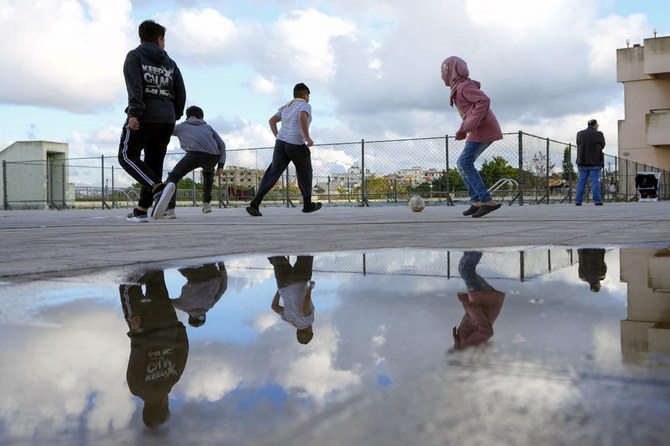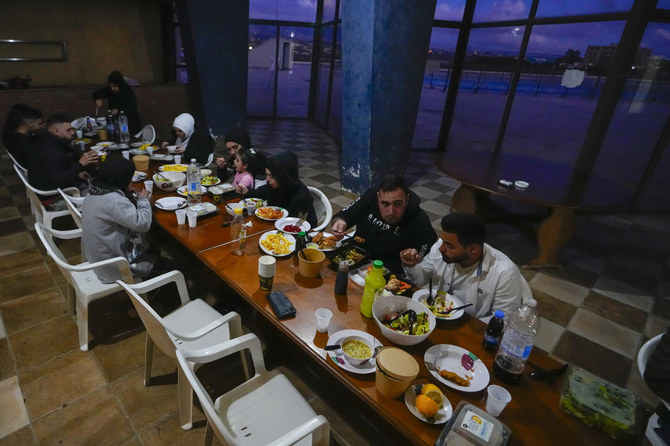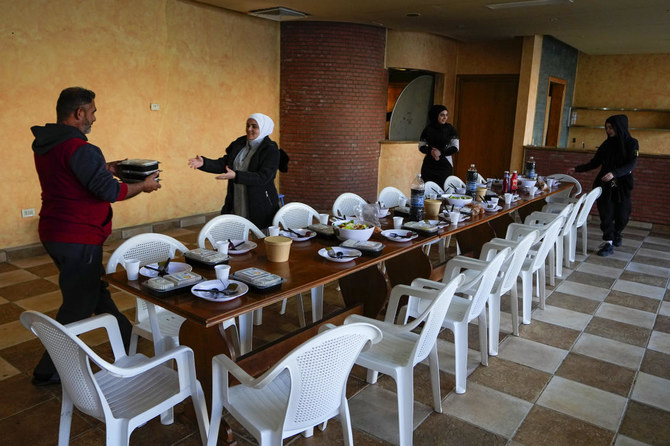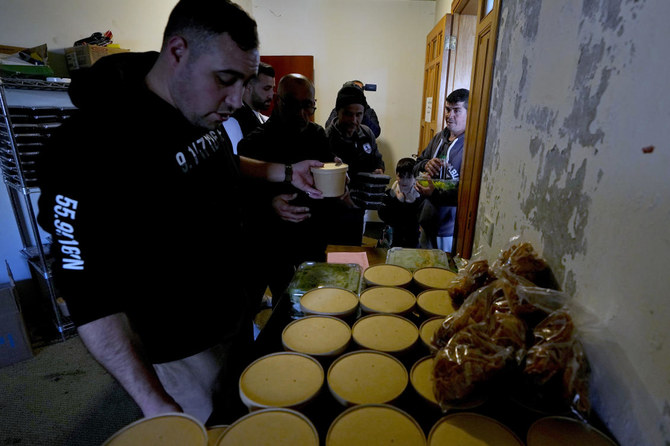MARWANIEH, Lebanon: Shortly before sunset on a recent evening, Mervat Reslan and a group of other women made french fries in vats of boiling oil to serve with that night’s iftar — the meal that breaks the daily fasts Muslims observe during the holy month of Ramadan.
They belong to roughly 60 families who have been sheltering at an abandoned hotel in the southern Lebanon town of Marwanieh to escape the shelling and airstrikes that have made it too dangerous to stay in their homes in the country’s border region with Israel. Although they’ve become a family of sorts to one another, many long to return home.
“Especially during Ramadan, you start thinking that your house is better — that you and your family all used to gather together, your children and their children, your in-laws and neighbors. And now you’re sitting by yourself in a room,” said Reslan.
Those living at the Hotel Montana, which went out of business in 2005, are among an estimated 90,000 people from southern Lebanon who have been displaced by the near-daily clashes between the militant group Hezbollah and Israeli forces. Another 60,000 Lebanese civilians have decided to stay in the border zone and risk the danger, according to a United Nations agency.
FASTFACT
The border clashes began with a few Hezbollah rockets fired across the frontier on Oct. 8, the day after Hamas’ deadly incursion into southern Israel and Israel’s ensuing bombardment of the Gaza Strip.
The border clashes began with a few Hezbollah rockets fired across the frontier on Oct. 8, the day after Hamas’ deadly incursion into southern Israel and Israel’s ensuing bombardment of the Gaza Strip. They quickly escalated to near-daily exchanges of rockets, shelling and airstrikes across the border and sometimes beyond.
Israeli strikes have killed more than 300 people in Lebanon. Most were militants from Hezbollah or allied groups, but more than 40 were civilians. Hezbollah strikes, meanwhile, have killed at least eight Israeli civilians and 11 soldiers, and displaced tens of thousands on that side of the border.
The cross-border attacks seem unlikely to end before a ceasefire is reached in Gaza — and possibly not even then. The prolonged state of limited conflict has left Lebanon, and particularly the displaced families, in limbo. School, work and farming in Lebanon’s border region have been put on hold. For a while, many hoped that a ceasefire would coincide with the start of Ramadan, but half of the holy month has passed without clear prospects for a solution.
Most of the displaced Lebanese have moved in with relatives or found shelter in vacant houses or rooms offered up by residents farther north. Those with the means have relocated to their second homes or rented apartments.
Shelters like the Hotel Montana are a last resort.
“A person can deal with 10, 15, 20 days, a month (of displacement), but we’re now entering the sixth month and it looks like it will go on longer,” said Ali Mattar, who heads the union of municipalities for the Sahel Al-Zahrani region, which includes Marwanieh.
The cash-strapped municipalities have been given much of the responsibility for dealing with the displacement, a task made more difficult by the four years of economic crisis the country has faced.
The Lebanese government has promised to compensate residents of the south whose homes have been damaged or destroyed. But the funding hasn’t been secured, said Maj. Gen. Mohammad Kheir, who heads the country’s Higher Relief Committee. A comprehensive survey hasn’t been conducted to assess how many houses are damaged, though it is “in the thousands,” he said.
Hezbollah has been providing monthly payments to many of the displaced families, an official with knowledge of the situation said. The official, who was not allowed to brief journalists and spoke on condition of anonymity, did not give a precise amount, saying it depends on a family’s size and needs.
Local and international nongovernmental organizations and religious charities have taken up much of the slack, but their resources are also strained. At the Hotel Montana, for instance, the Red Cross provides diesel to run a generator, but it can only be run for two hours in the morning and five in the evening because the supply is limited, said Salam Badreddine, who oversees disaster management for the union of municipalities.
The US and France, among other countries, have engaged in diplomatic missions to try to prevent the border conflict from escalating into full-scale war. But even if they succeed, some fear that a continuous state of low-level conflict could become the new normal.
“I think the risk of an all-out war still exists, and I would argue that it’s high,” said Emile Hokayem, director of regional security at the International Institute for Strategic Studies, a London-based think tank. But there is also a potential for a long-term simmering conflict that would “exhaust” the struggling Lebanese economy and society, he said.
“What I worry about is this ability to rationalize levels of violence and adjust to them, and (to think that) as long as we’ve avoided the big one, we’re fine,” he said.
Reslan said her family was briefly displaced during the brutal monthlong war between Hezbollah and Israel in 2006, but this time feels different. Shelling has already damaged her family’s house, and she is afraid that the extended displacement will become permanent.
“We’re afraid — not of Israel but that we won’t return to our houses and villages. That’s the only thing we’re afraid of,” she said.
Mohammed Issa, a construction worker and farmer, fled the village of Aitaroun with his wife and three children on Oct. 8, when shells began falling next to his house. They stayed for two months with another family before moving to the Hotel Montana. Now he’s counting the days until they can go home.
“If there’s a ceasefire, we’ll be on the highway and at our house within an hour,” he said.
When displaced families do finally return home, they could face the grim reality of damaged homes, burned fields and a lack of resources to help, said Jasmin Lilian Diab, director of the Institute for Migration Studies at the Lebanese American University.
“It is not so much a conversation of whether or not they will eventually be able to go back, but what are they going back to,” she said.



















